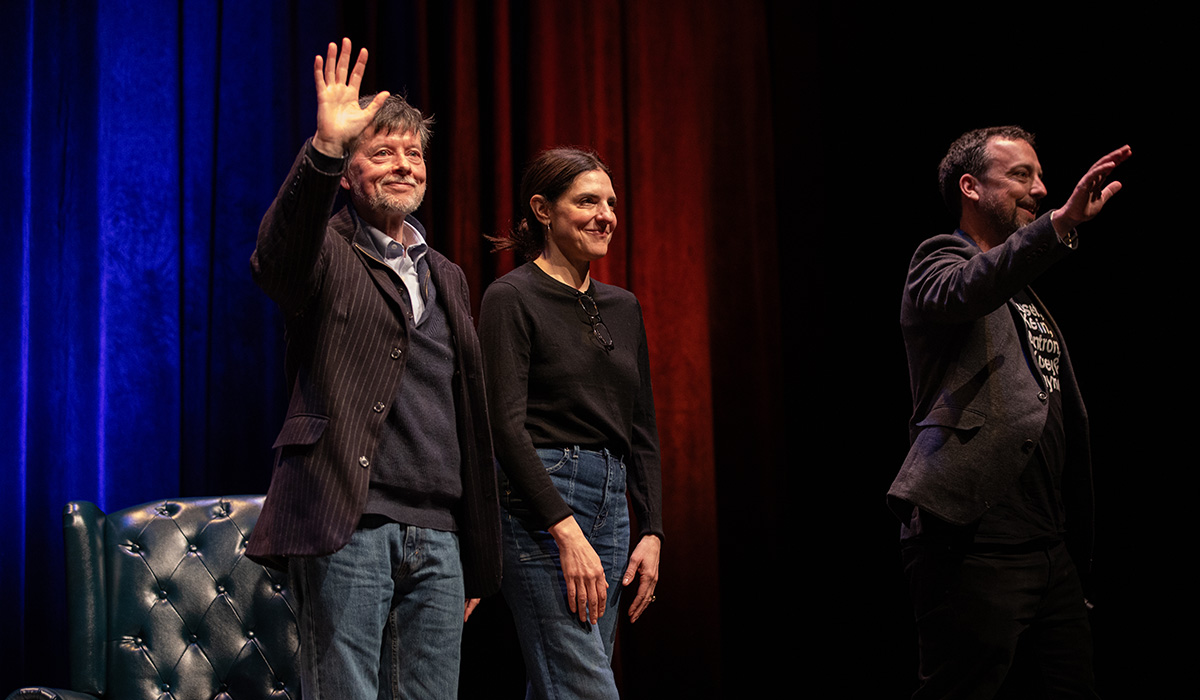
History holds the valuable power to shape the future and can bring people together to investigate who we are and what we can become. As iconic storyteller Ken Burns has found, “There’s no them. It’s only us.”
On April 5-6, Gettysburg Film Festival: The Art of Ken Burns was held at Gettysburg College and throughout the local community. The festival showcased American history and identity on screen—from documentaries and feature films to emerging media. Inspired by Burns and his award-winning filmography, the festival explored the stories that have come to define our nation.
“In his Gettysburg Address, Lincoln evoked the past to set us on a path toward realizing, more fully, the founding ideals of our republic. Thousands gathered to hear this important message,” Burns observed. “Now we, too, must gather and reflect on our history to solve the problems of today and to heal a deeply divided nation.”
The festival featured programming across two days and included live discussions with Burns and special guests, such as film producer Sarah Botstein, actors Martin Sheen and Sam Waterston, Eisenhower Institute Chair Emerita Susan Eisenhower, and musicians Jay Ungar and Molly Mason.
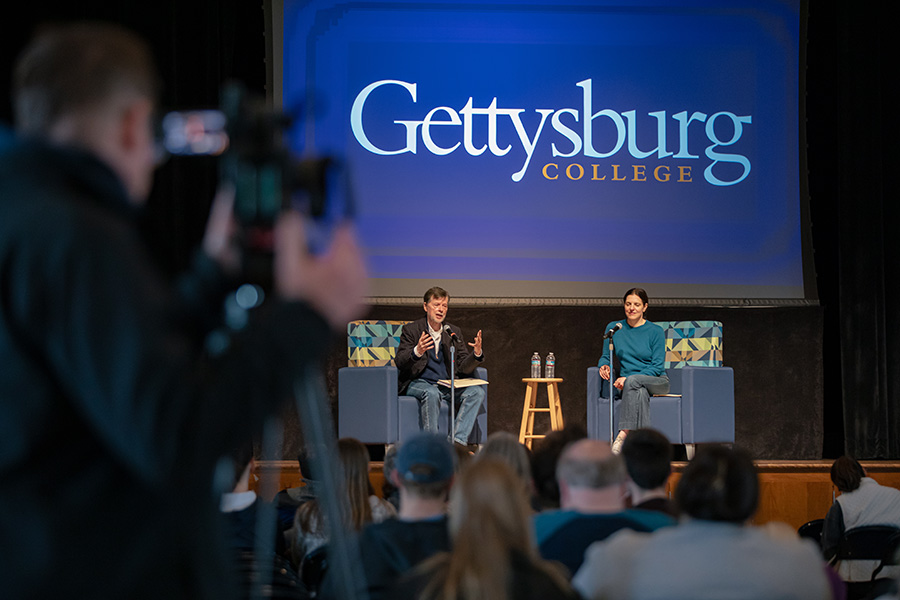
Inspiring the next generation of storytellers
Burns visited the College Union Building Ballroom on campus for an event specifically for Gettysburg College students on Friday, April 5.
The talk and clip reel presentation, “Consequential Elections,” was edited by Festival Director Jake Boritt in partnership with Burns’s production company Florentine Films. The reel featured segments from Thomas Jefferson, The Civil War, and Jackie Robinson. The presentation was followed by a live Q&A with Burns and award-winning filmmaker and longtime collaborator Sarah Botstein.
Gettysburg College Political Science Prof. Alauna Safarpour opened the event with a call to action for students.
“Every day, it’s your choice to stand for the ideals of our nation—to push our country to ensure the American promise of life, liberty, and the pursuit of happiness are not just empty promises or clever words,” Safarpour said. “You, too, can help to fulfill that ‘unfinished work,’ which Gettysburg will forever symbolize.”
Gettysburg College President Bob Iuliano then welcomed Burns and Botstein to the stage. He emphasized how, throughout their lives and careers, the filmmakers have used the art of storytelling to help audiences gain a fuller picture of the strength of our democracy and ourselves as Americans.
“We talk a lot here about A Consequential Education and what it means to lead a consequential life in service to something greater than oneself,” Iuliano said. “Today, we’re going to have the opportunity to learn from two people who have truly led consequential lives—people who, as we’ve just seen, have deepened our understanding of the American story and the responsibilities entrusted to each of us to contribute our own verse to it.”
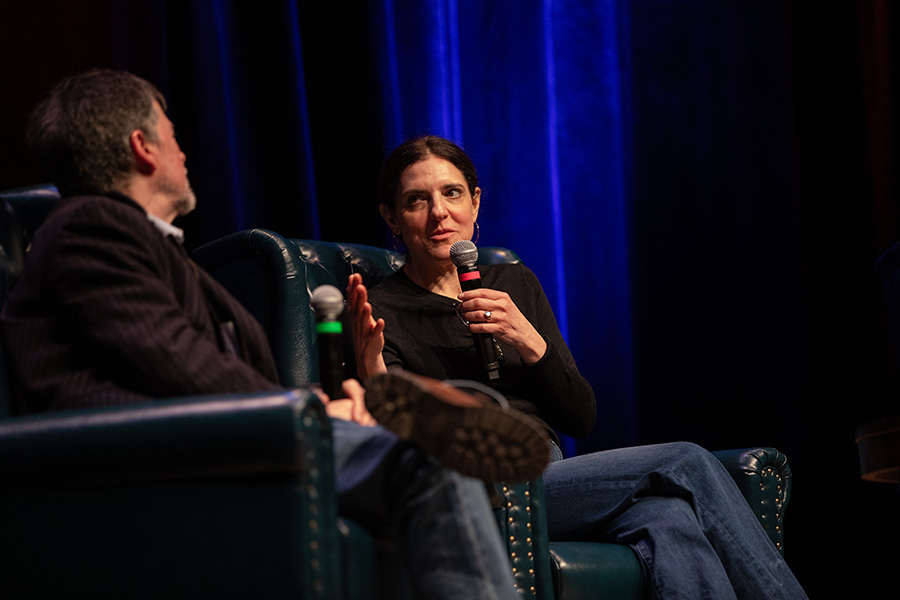
Burns underscored the duties that American citizens have during consequential elections, reiterating how revisiting history can teach us how to uphold these duties.
“All humans up to recent human history have been subjects. Now, we’re making something new when we fulfill our requirements to be a citizen,” Burns explained. “We have to remind ourselves of the supreme obligation of citizenship in trying times.”
Burns and Botstein also spoke about their creative processes and what they consider when crafting a new story. Botstein highlighted the importance of utilizing storytelling to express truthful historical memory.
“What we do day in and day out is take a famous subject or a famous moment in history, and we try to get it as close to some kind of truth about that moment and then bring it to life,” Botstein shared.
Burns focused on how practice heavily influences filmmaking. He referenced a quote from Ann Lee, the founder of the American Shakers group featured in Burns’s documentary The Shakers: Hands to Work, Hearts to God: “…do all your work as though you had a thousand years to live, and as you would if you knew you must die tomorrow.”
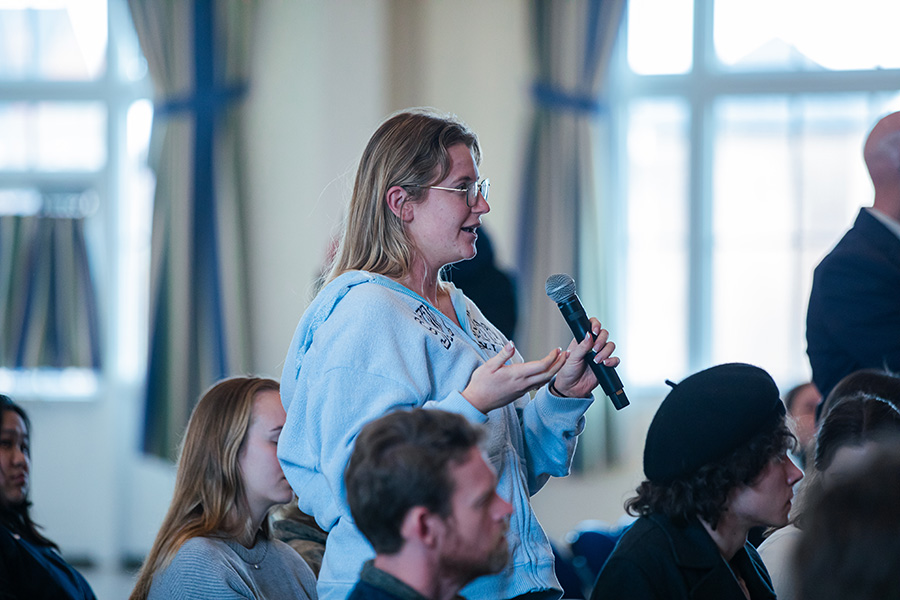
Gettysburg College students were then awarded the opportunity to ask Burns and Botstein questions about their careers, the clip reel, and their perspectives on the state of world affairs. It was an experience Gettysburg College students will cherish, given the deep insight they gained from engaging with world-renowned documentarians firsthand.
“Gettysburg is a valuable place for historians, and it provides amazing opportunities for students such as this,” said Elizabeth Houston ’27, an environmental studies major with minors in educational studies and public history. “The College is a place where people can come together through unique opportunities like this to learn.”
Maggie Matheson ’26, a history major with minors in Civil War era studies, English, and public history, reflected on the event. “The way they presented these clips brought a lot of patterns of American history to light. It means a lot to our College community that he was able to be here, and it supports Gettysburg College and the work that started here with the battle.”
Following the live discussion, Burns met with a small group of selected students to discuss his filmography and answer their questions. The session was an impactful experience where students could have a closer conversation with Burns.
That evening a sold-out audience at Gettysburg Area High School watched a clip reel titled “Lessons from Lincoln.” It was followed by a conversation among Burns and award-winning actors Martin Sheen and Sam Waterston, moderated by Boritt.
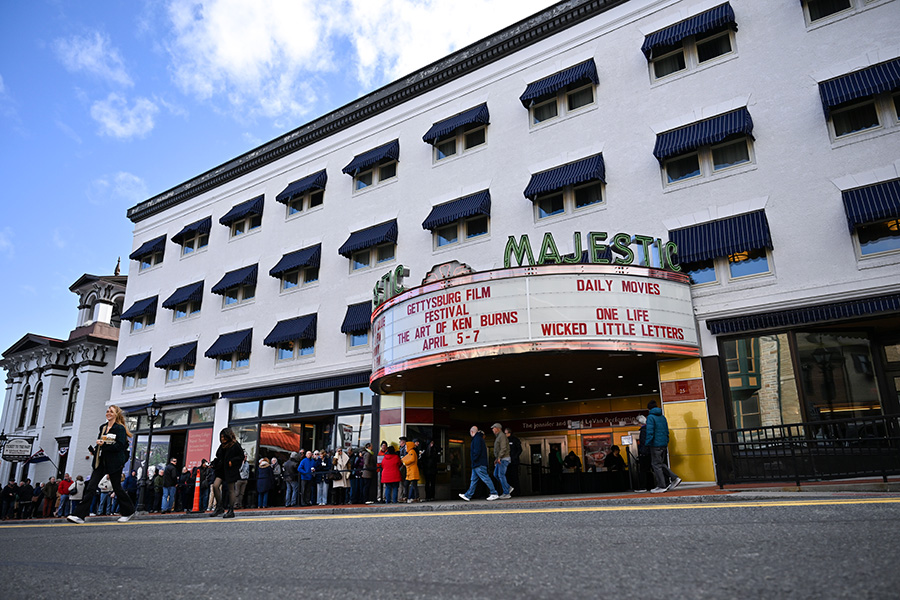
Bridging past and present through filmmaking
The impactful talk and clip reel presentations were sold out at Gettysburg College’s Majestic Theater on Saturday, April 6. They emphasized the importance of reflecting on the nation’s past while looking toward the future of our democracy.
Gettysburg resident and Gettysburg College alumna Nancy Lorenson Cook ’75 shared her excitement for the events at the Majestic Theater. “I think it’s a wonderful opportunity for our community, as well as guests and alumni who have come, to experience different points of view and gain a history lesson at the same time,” she said. “It’s such a majestic place, and I’m thrilled to be here.”
The first event, “Our Democracy Challenged,” began with a presentation from the nonprofit organization The Better Angels Society. The Better Angels Society recognized two up-and-coming documentarians who won 2023 Next Generation Angels Awards for their films.
Jay Patel was awarded the second-place prize within the junior division (grades 6-8) for his film Pearl Kendrick, which recognized the bacteriologist who co-developed the first successful whooping cough vaccine. Abigail Giroux won first place in the senior division (grades 9-12) for her film Wade in the Water: How African Americans Got Back in the Pool. It highlighted the legacy of segregated swimming.
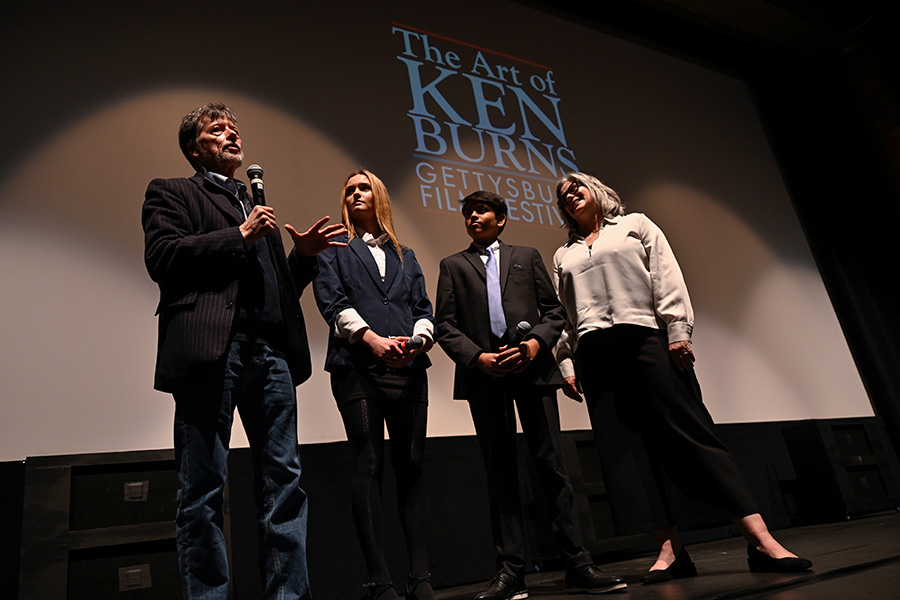
“I’m grateful to The Better Angels Society for their support of my own work and for the Library of Congress prize in my name, but nothing makes me more proud than to see the kind of work that Abigail and Jay have done and to see how beautifully researched, fair, and balanced; how revelatory; and how emotionally satisfying their films are,” Burns said. “They represent the next generation.”
Film Festival Director Jake Boritt then introduced the clip reel for “Our Democracy Challenged,” which included segments from The Civil War, Huey Long, The Congress, and The U.S. and the Holocaust.
Burns was again joined by Botstein for a discussion that was moderated by Boritt. Botstein shared how the story of the past can often be the most helpful and constructive teacher.
“One of the things we try to do in our work is to tell good stories so that people get to history through those stories,” Botstein said. “Our editing room is about telling good stories so that we can learn from our past to make a brighter future.”
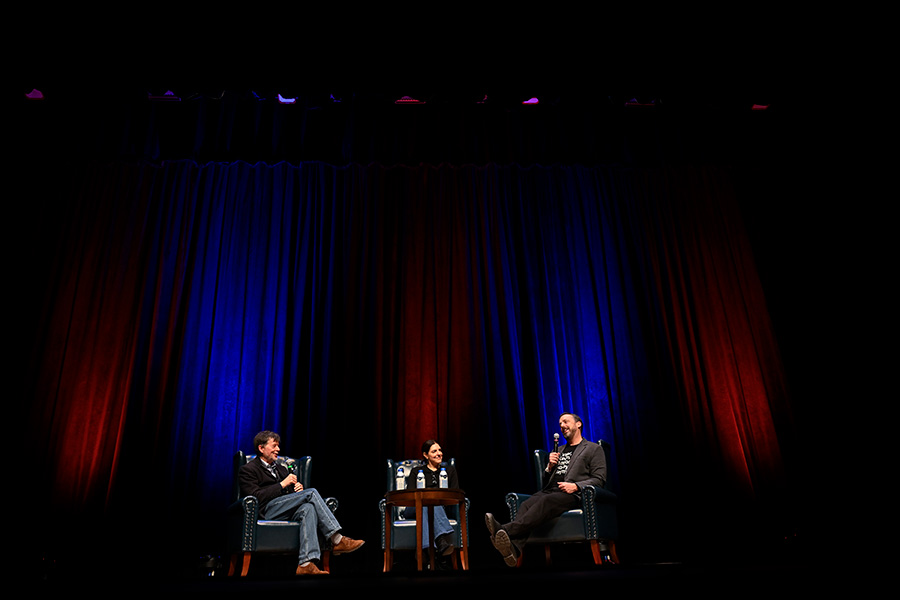
Burns reflected on the importance of looking toward history on screen to influence our modern-day democracy.
“If you don’t know where you’ve been, you can’t possibly know where you are or where you’re going,” Burns said. “We are obligated in this moment to gather as much as we can and everything that has come before this moment. The collective human experience: the good, bad, and otherwise.”
“I have ultimate respect for Ken Burns and all of the work that he has done, his incredible knowledge, and how he looks at history over time,” Baltimore resident and attendee Kathy Lochary said. “Sometimes history repeats itself, but eventually things work out. There’s a reason to be hopeful for our country, and that’s why I’m here.”
The second event at the Majestic showcased the “Consequential Elections” clip reel and a discussion between Burns, Boritt, and Susan Eisenhower, Chair Emerita of Gettysburg College’s Eisenhower Institute. President Iuliano introduced the presentation and connected its content to the work being advanced at Gettysburg College.
“As we examine the presidential elections that have tested us and defined us as citizenry—from President Lincoln’s re-election amidst the Civil War to more recent contests that have shaped our modern political landscape—may we remember Lincoln’s charge to us, one that we often sound to our students here at Gettysburg College: ‘to be dedicated here to the unfinished work for which they who fought here have thus far so nobly advanced,’” Iuliano said.
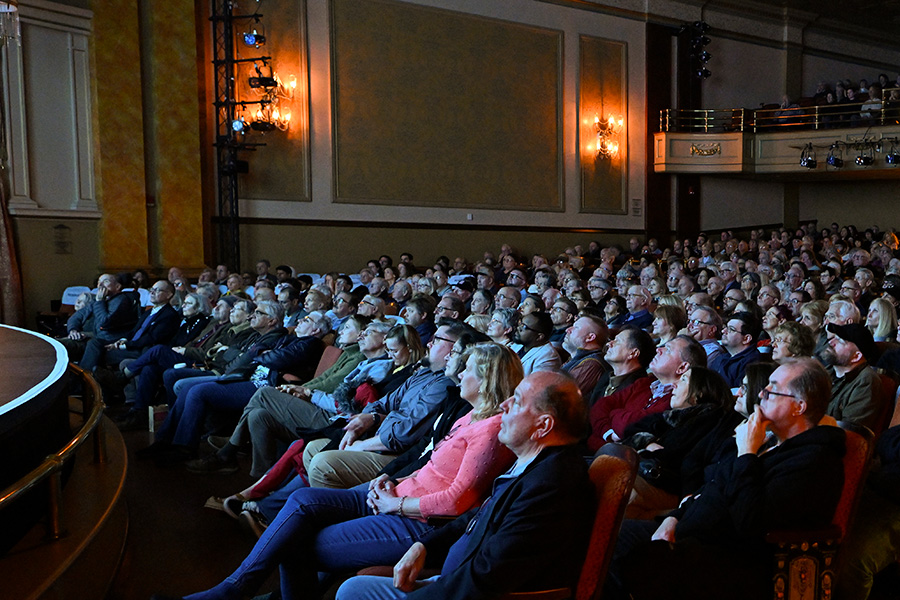
Eisenhower recognized a similar sentiment in how Burns’s work can influence the world of today and can speak to the nation’s political atmosphere.
“Everything you put together there [in the film reel] is so resonating for our times, and one point I’d like to make about that is I think it’s never been more important,” Eisenhower said. “I hear constantly, all the time, that the political end of the world is coming, but I think what you demonstrate is that America has gotten through a lot.”
Burns reiterated the importance of learning from the nation’s history to move forward.
“We’re constantly in the process of becoming—it’s a more perfect union, it’s in pursuit of happiness,” Burns explained. “If we learn about this history, if we learn ever more about it, then as Lincoln said, we will save our country.”
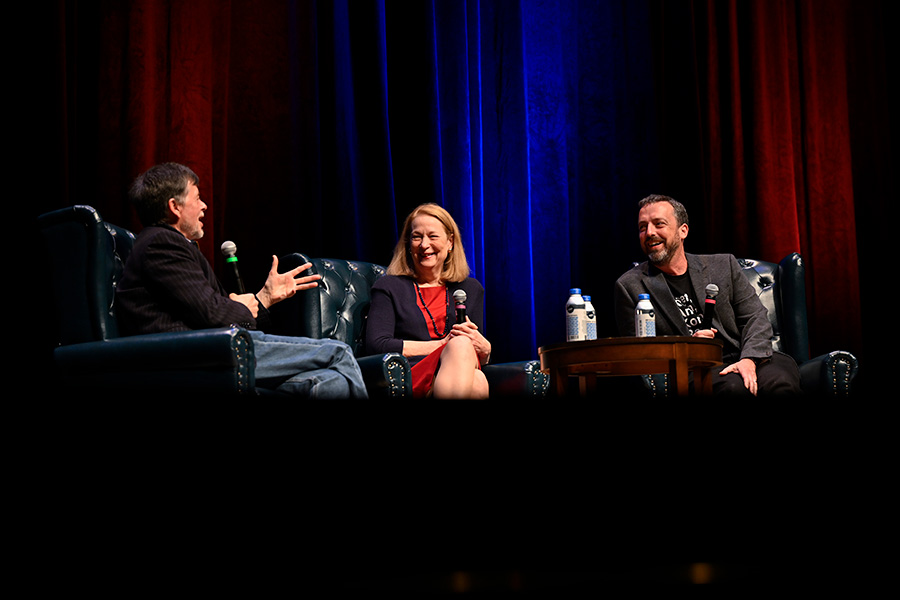
The Majestic Theater also held screenings of Burns’s other works throughout the day, including Huey Long, the first episode of Not for Ourselves Alone: The Story of Elizabeth Cady Stanton and Susan B. Anthony, episode one of The U.S. and the Holocaust, and The Statue of Liberty.
On Saturday night, “An Evening with Jay Unger and Molly Mason” was held to highlight the music within Burns’s films. The events that took place the following day included “A Conversation with Sam Waterston” and “Storytelling on YouTube: A Live Episode with The History Underground and Vlogging Through History” with J.D. Huitt and Chris Mowery.
The festival was hosted by Gettysburg College and the Adams County Historical Society. During his time in Gettysburg, Burns toured the in-progress restoration of Little Round Top, the crucial battle site, at Gettysburg National Military Park. Burns, actor Martin Sheen, and their party were guided by Gettysburg National Military Park Supervisory Ranger Chris Gwinn ’06. Burns, Botstein, Boritt, and Festival Producer Andrew Dalton ’19 then visited Gettysburg’s Lincoln Cemetery. Here, remains of more than 450 Black Americans, including Underground Railroad freedom-seekers and Civil War veterans, are buried. More than 130 graves are unmarked.
In all, the Gettysburg Film Festival: The Art of Ken Burns garnered attendees from 27 states across the country and Canada. All the events held at the Majestic Theater were sold out, underscoring the legacy that Ken Burns has created and the desire of the American people to better understand their origins as a citizenry.
“[Ken Burns] is very articulate in the way he tells stories about our history, the points he makes about each generation, and telling stories to inscribe us,” Gettysburg resident Chris Lupolt shared. “Gettysburg can attract such qualified people, and this is a place where history lives on.”
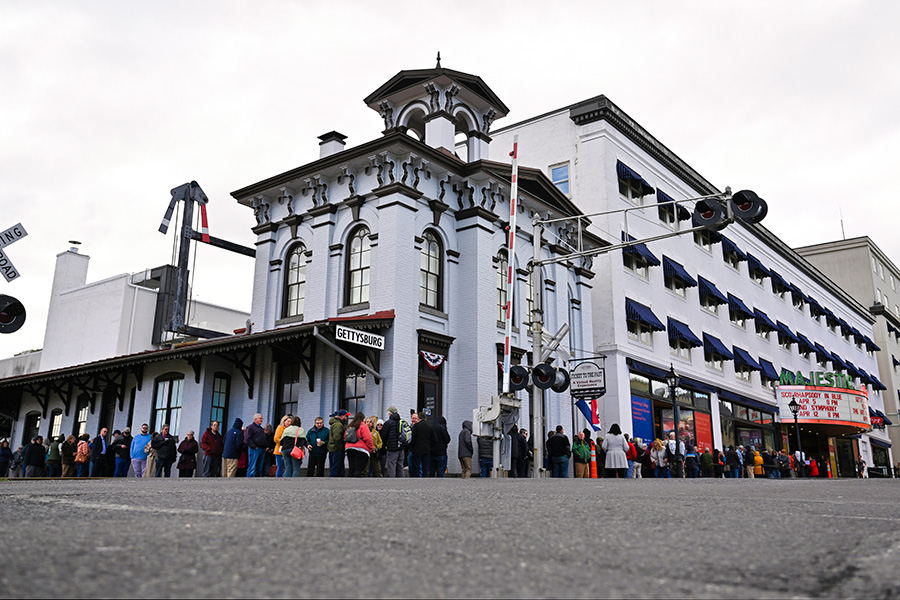
Special thank you
Gettysburg College extends its deepest thanks to Ken Burns and his collaborators; Film Festival Director Jake Boritt; Film Festival Producer Andrew Dalton ’19; the Majestic Theater staff; and our generous sponsors who made this ambitious endeavor a reality: Cliff Bream and Julie St. John; Elsie D. Morey; Monica E. Oss and J. Jay Mackie (Gold); The Better Angels Society; David ’68 and Pauline LeVan (Gold); Ken ’66 and Elizabeth Lundeen (Platinum); Dave ’85 and Cynthia LeCompte ’84 Salisbury P’15 (Gold); Mary and Jed Smith; 8 Point Management Company; Coronation Media; Historic Gettysburg-Adams County Preservation Society; Robert R. Marshall and Greta L. Ratliff; Michael A. Schen; The Sign of the Buck; and David and Ellen Sites.
View Film Festival Photos
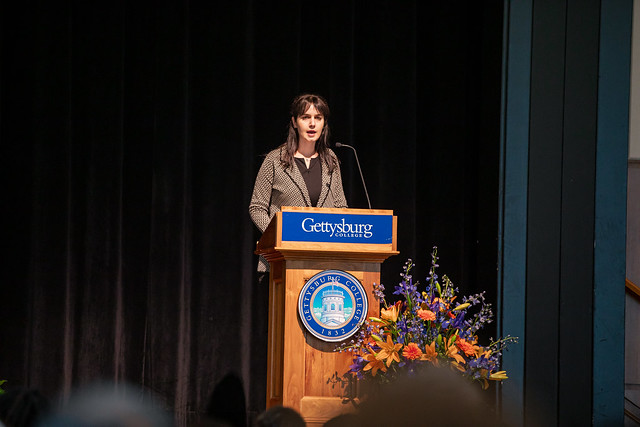
Learn more about Gettysburg Film Festival: The Art of Ken Burns. Visit the Majestic Theater’s website for future events, films, and performances in Gettysburg.
By Laken Franchetti ’24
Supporting editorial by Katie Lauriello ’25
Photos by Diptiman Das ’27, Abbey Frisco, Sofia Gutierrez ’26, Jason Minick, and Amber Tetmeyer ’27
Posted: 04/19/24